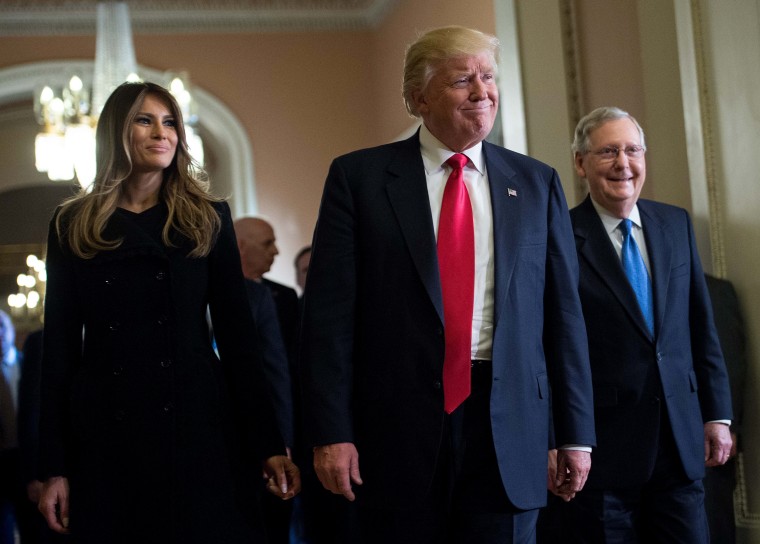The markets were supposed to do a swan dive if Donald Trump was elected president, but the Dow Jones Industrial Average sustained two days of gains that brought it to a record high again on Friday. What happened?
“I think most people expected a very bad reaction in the markets to the Trump election, and I think a lot of people were basing that on Brexit,” said Robert Johnson, director of economic analysis at Morningstar.
But unlike Brexit, the market found an upside to Trump’s policy positions.
“I think what happened is the reality kind of set in a little bit,” Johnson said. “It seems like maybe some stimulus spending is on the way and perhaps some tax cuts and less regulation,” which are viewed as positive developments by traders.
“I think people are realizing that the election changes the Republican party. He did not run as a deficit hawk,” said Aaron Klein, a fellow at the Brookings Institution.
The bounce was unevenly distributed among sectors, though, and already showed signs of flagging on Friday, when all three major U.S. indices were down.
“It would seem to me that it wasn’t necessarily broad — there were winners and losers,” Johnson said. “It was not an across-the-board thing.”
“It’s very sector specific,” Klein said. Bank stocks did especially well, a combination of two expectations: a rollback of regulations like the Dodd-Frank Act implemented after the financial crisis, and higher interest rates.
The good old days?
“The good old days on Wall Street are coming back,” he said. Other sectors that saw big run-ups included oil companies and refiners, construction and materials firms, and drug companies, from which there had been a retreat in anticipation of a regulation-setting Clinton administration.
Although equities fared well in the immediate aftermath of the election, economists point out it’s another story in the bond market.
“Bonds have done quite poorly,” Johnson said. Although Trump’s proposals might goose growth, they don’t come without a trade-off. “It means more inflation and higher interest rates, which is bad for the bond market,” he said.
And that’s not even economists’ biggest worry. Two of the positions that dominated Trump’s message on the campaign trail — namely, costly trade wars with China or Mexico and mass deportations that would crimp the labor market — could be much more harmful to economic growth.
Largely, though, it seems that the investor class is hoping either he changes his mind after inauguration or is stopped by Congress.
“We doubt that Trump will follow through fully on his threats to impose large trade tariffs on Mexico or China, or to withdraw from existing deals,” analysts from Capital Economics wrote in a recent research note, which also referenced “checks and balances in the U.S. political system” that could keep some of this risk in check.
Of course, there’s a risk in this assumption as well.
Best friends forever
“We don’t actually know what Congress and a President Trump are going to be able to negotiate with each other,” said Kim Caughey Forrest, vice president and senior equity analyst at Fort Pitt Capital Group.
Senators and House members up for reelection in 2016 will have their eye on how constituents at home might react to their support or rejection of various Trump proposals, and, as president, he will have to take those priorities into account when working with lawmakers.
“For any of those things you need money, and who controls money? Congress,” she said. “It’s not like running a company.”
Short-lived euphoria
Others were also skeptical of the already-fading longevity of the market’s enthusiasm.
“We doubt that the euphoria will last,” Capital Economics said. Higher inflation will put a drag on the market if it goes too high or rises too rapidly, and the nature of the infrastructure investment Trump has proposed — largely tax cuts — don’t benefit companies in the construction sector as directly as other kinds of funding.
“And finally, investors may start to worry again soon about the implications for growth of Trump’s other proposals, such as trade tariffs,” they said.
